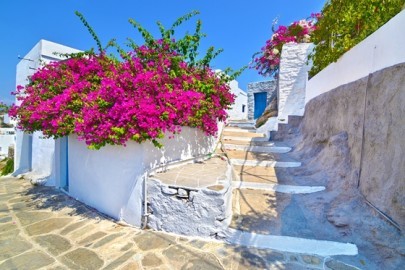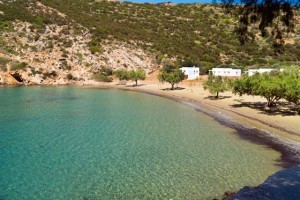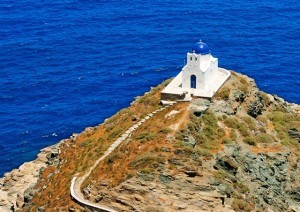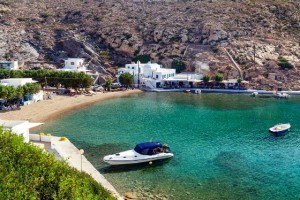Sifnos, the island of flavours, is the birthplace of famous poets, like Ioannis Gryparis, Kleanthis Triantafyllou (or Rampagas) and Aristomenis Provelegios, as well as award-winning chefs, like Tselementés. Unique traditional villages, organized or secluded beaches, and 227 churches spread around the island are waiting to be discovered.
– Let’s explore the island’s picturesque settlements:
Apollonía
Apollonía, the capital town of Sífnos (also called Hóra), is built in the shape of an amphitheater over three hills in the center of the island. The narrow streets and the whitewashed houses of Hóra form a beautiful, traditional Cycladic settlement. During your evening walk, pay a visit to the Folklore Museum at the Hiróon Square (meaning “Square of the Heroes”).
In every small taverna or classy restaurant in Hóra you can sample some of Sifnos’ exceptional dishes cooked by chefs who know how to tempt our taste buds. When the night falls, set out to discover fancy lounge bars and the hottest nightclubs in the island, and dance the night away! Apollonía also boasts elegant hotels, and homey guesthouses.
Artemonas
A few kilometers away from the town lies the traditional settlement of Artemónas, famous for its neoclassic mansions and its outstanding panoramic view of the island. Some of the most famous restaurants and patisseries of Sifnos will welcome you here with fresh homemade cookies and hot doughnuts. If you need to spend a relaxing vacation, then Artemónas is the ideal place to book your accommodation.
Kastro
The historic settlement of Kástro (meaning “castle”), inhabited since ancient times, is built over the ruins of ancient Sífnos, on an abrupt rock with a breathtaking view of the sea. A beautiful outdoor museum and one of the most picturesque villages in the island, Kástro stands out for its old houses with the wooden balconies, the ancient columns and the narrow courtyards.
The visitor still enters the village from “lozies”, the castle’s old entrances. In the past, these arcade-like entrances were used as war towers in order to protect the settlement. The houses in the front, built one next to another, used to be inhabited by lower class people, whereas the inner, and more protected part of the settlement was occupied by the upper class. Admire the picturesque little church of “Eftamártyros” (Church of Seven Martyrs), perched on a rock that seems to rise from the sea, and don’t forget to visit the Archaeological Museum.
Pottery
Sífnos is the center of pottery in the Cyclades since the first samples that were found here are dated back to the Early Cycladic period. The island’s clayey soil in combination with the continuous sunshine resulted in the development of the art of pottery on the island. Throughout the island there are many pottery workshops where you can buy ceramics for domestic use, utensils and decorative items.
– Taste mouth-watering local specialties:
Chick pea balls
Manoúra (cream cheese)
Mastélo (lamb cooked in red wine and spices)
Amigdalotá (small round sweets with pounded almond, rosewater and caster sugar)
Honey pie
Swim in crystal-clear waters
Whether cosmopolitan or secluded, all the beaches in Sífnos offer to the sun-loving tourists azure waters and sun-drenched sandy beaches. Kamáres, the port of the island, is a sandy beach with trees and beach bars; Platís Yialós is the most cosmopolitan and buzzing beach in the island, whereas next to it lies Vathí, a sandy beach with shallow waters and many tavernas where you can enjoy fresh fish. The rocks in Chrisopigí, where also the homonymous Monastery proudly stands, are ideal for diving. If you’d like to rest under a cool shade, head to the next beach which is surrounded by saltwater-loving trees. If you find yourself in Kástro, follow down the path to “Eptá Mártyres”, and enjoy a leisurely swim or unwind with a book lazing on a sun lounger.
Sources: visitgreece
Ask me anything
Explore related questions








